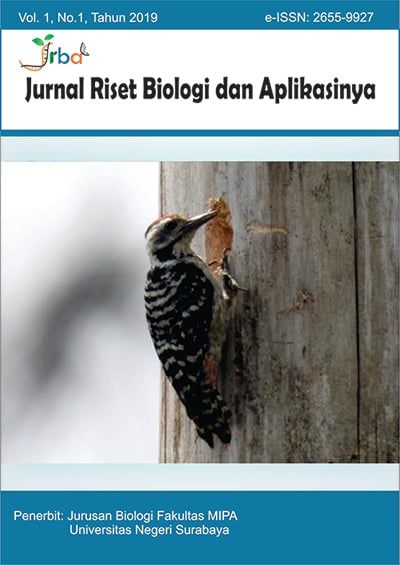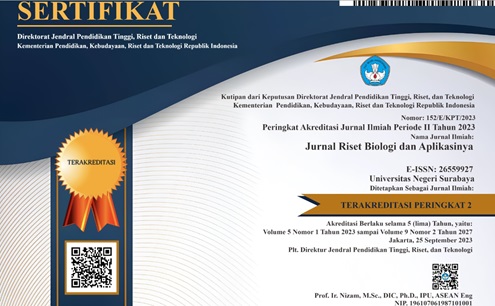The Students Worksheet Development on Fungi Based on The Plus KWLs Strategy to Train the Metacognitive Skills
DOI:
https://doi.org/10.26740/jrba.v1n1.p32-39Keywords:
Effectivity, metacognitiveAbstract
The objective of this research was to produce worksheet of fungi material based on Plus KWLs strategy to train the metacognitive skills seen at the effectiveness. The type of this research was a development with a 3D research design that was shortened into define, design and development. The subjects of this study were students of class X MIA 1. Instruments used in this study was test. Based on the effectiveness of worksheet based on Plus KWLs strategy was obtained from pre and posttest result which have been tested from the positive value sensitivity. This worksheet can be used to train the metacognitive skills by very good criteria that were determining the level of confidence and score. It can be concluded that the worksheet based Plus KWL ˜s is very effective to train metacognitive skills
References
Camp, D. (2000). œIt takes two: teaching with twin text of fact and fiction. The Reading Teacher. 53 (2): 400408.
Dobbs, O. (2003). Using reading strategies to reduce the failure rate in the content area subject: Social studies. Grade level: 6-7-8. (ERIC Document Reproduction Service ED 479 208).
Flavell, J. H. (2004). Theory of mind development: Retrospect and prospect. Merrill Palmer Quarterly. 50 (3): 274-290.
Gronlund, N.E. (1982). Constructing Achievement Tests 3rd Edition. Englewed Cliffs, New Jersey: Prentice Hall.
Larkin, S. (2009). Metacognition in young children. New York, NY: Routledge.
Livingston, J. A. (1997). Metacognition: An overview. Received from http://www.gse.buffalo.edu/fas/shuell/CEP564/Metacog.htm at 21.11.2008.
Martorella, P. H., Beal, C. M. A., & Bolıck, C. M. (2005). Teaching Social Studies İn Middle and Secondary Schools. New Jersey: Merrill Prentice Hall.
Mok, M. M. C., Lung, C. L., Cheng, D. P. W., Cheung, H. P. C., & Ng, M. L. (2006). Self-assessment in higher education: experience in using a metacognitive approach in five case studies. Assessment & Evaluation in Higher Education. 31: 415433.
Pennington, M. (2009). The Dark Side of the KWL Reading Strategy, (online), (http://penningtonpublishing.com/about.php)
Pesman, Haki. (2010). Development of a Three Tier Test to Asses Ninth Grade Students Misconception About Simple Electric Circuit. Thesis for Master of Sciences. Middle East Technical University, Turkey.
Ruddel, Martha Knapp. (2005). Teaching Content Reading and Writing. Hoboken: John Wiley and Sons, Inc.
Slavin, R.,E. (2006). Educational Psychology; Theory and Practice. Pearcon (8th Edition). Boston; Pearson Education Inc.
Susantini, E., Sumitro, S.B., Corebima, A.D., and Susilo, H., (2018a). The Development of Biology Material Resources by Metacognitive Strategy. Asia Pacific Education Review.16 (2): 401-411.
Susantini, E., Indana, S, and Isnawati (2018b). Using Metacognitive Strategy to Teach Learning Strategies A Study of Indonesian Pre-Service Biology Teacher. The New Educational Review.52 : 258-268.
Szabo, Susan. (2006). KWHHL: A student-driven evolution of the KWL. American Secondary Education. 34 (3).
Tok, Åžukran. (2013). Effects of the know-want-learn strategy on students mathematics achievement, anxiety and metacognitive skills. Metacognition Learning. 8: 193212.
Downloads
Published
How to Cite
Issue
Section
 Abstract views: 585
,
Abstract views: 585
, PDF Downloads: 445
PDF Downloads: 445












